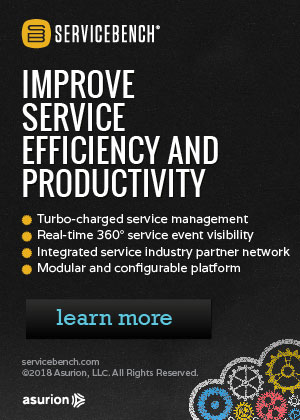is the latest in an ongoing series of contributed editorial columns. Readers who are
interested in authoring a contributed column in the future can click here to see the
Guidelines for Editorial Submissions page.
Selling Peace of Mind:
With all the negative publicity generated by the "expiring warranty" telemarketing scam, these days it's the auto dealers that need some reassurance about the value of selling vehicle service contracts to consumers. Below is a list of some of the benefits of the different types of VSCs, followed by two different lists compiled by industry associations that can help consumers spot a scam before they buy into it.
While the economy struggles to find a foothold for ascent, consumers continue to look to the pre-owned market when they need to purchase an automobile. Even consumers who have leased in the past are finding that more stringent lease terms in the present are making a used car payment much more affordable.
In the past, many customers cared more about the appearance of a used vehicle than its mechanical condition. Today's educated consumers are keeping their vehicles longer and want reassurance that they won't end up paying more for repairs than they saved by buying a pre-owned car.
Fortunately, vehicle service contracts (VSCs) provide a way for dealers to offer used car customers protection against unexpected repair costs. For many consumers, the resulting peace of mind is well worth the investment in the plan.
Consumer Benefits of Purchasing a VSC
- Protect Your Investment - Vehicle service contracts allow consumers to ensure that their vehicles will perform reliably for as long as they own the car. According to industry experts, auto owners with warranties tend to take their cars in for service sooner, preventing further damage, and more regularly than owners who have to pay for repairs out-of-pocket.
- Reduce the Cost of Ownership - In today's economy, consumers are keeping their vehicles an average of 9.2 years - much longer than in the past. They are obtaining longer-term loans in order to have lower monthly payments and looking for ways to reduce the cost of ownership. Service contracts provide the security of budgeting a fixed payment, rather than paying for repairs at the time of service, and avoiding unplanned and expensive repairs. Considering that the average hourly rate for mechanic labor is $90 to $120, a VSC often pays for itself after the first claim.
- Ensure Performance of the Vehicle - Even when a car has life remaining on the factory's powertrain warranty, other vital components and systems can fail. A vehicle service contract can cover items excluded from the manufacturer's warranty to keep the vehicle performing to industry standards.
- Provide No-hassle Payment - A VSC provides direct payment to the repair facility for all covered repairs. Consumers do not have to submit any paperwork or pay up front and wait for reimbursement (though a deductible may apply).
- Add Value to Your Automobile - Most vehicle service contracts can be transferred to a new owner alongside the sale of the car. Otherwise, the provider will refund any portion remaining on the contract if it is cancelled before expiration.
Many consumer guides to buying used cars provide solid reasons for consumers to purchase vehicle service contracts. The National Independent Automobile Dealers Association's 10 Keys to Buying a Used Car, for example, advises consumers to check 10 areas of a pre-owned vehicle: the body, under the hood, the electrical system, the trunk, springs and shocks, the interior, the engine, the drive shaft and rear end, the steering system and the brakes. Of these 10 recommendations, seven are items that would be covered by a service contract.
Types of Vehicle Service Contracts
Although each service contract provider offers slightly different service plans with different names and deductible options, the most common levels of coverage fall into one of four categories.
- Powertrain -- Normally the least expensive plan, a powertrain warranty covers engine, transmission, drive axles and transfer case. The actual components covered vary from provider to provider. Since this level of coverage includes the "big ticket" items that are most costly to repair, it is likely the easiest to sell to your customers.
- Powertrain "Plus" -- This plan covers all of the powertrain components plus vital systems such as the brakes, the fuel system, the engine cooling system, the electrical system, steering, and air conditioning. Designed for vehicles with high mileage, this warranty costs more but covers the major systems most likely to need attention in older vehicles.
- Total Coverage -- All of the systems in the first two levels are covered under this plan, plus advanced systems such as automatic windows and doors, wiper and antenna motors, cruise control, and other electronic components. Often this plan also expands coverage of parts within the systems covered by the first two service levels.
- Exclusionary -- Commonly known as "bumper-to-bumper," this is the most comprehensive and expensive plan and is similar to the factory warranty that comes with a new car. This plan covers everything but the items specifically listed as exclusions. Typical exclusions are glass, light bulbs, trim and molding, brake rotors and drums, shocks, batteries, air bags, tires, etc. This kind of VSC normally is available only for low-mileage cars.
Some service contracts also provide additional benefits such as roadside assistance via a toll-free number, towing, a rental car during authorized repairs, lost key/lockout service, and trip interruption reimbursement.
No matter which level of coverage a consumer chooses, the vehicle must be routinely maintained in order for the service contract to remain valid. Services such as oil changes, tune-ups, tire rotation, and manufacturer-recommended major services are required. If required maintenance services are neglected, the VSC may become void. Make sure your customers know that they must keep record of routine service in the event documentation is requested during a claim.
Well-informed Customers are Happy Customers
The best way to make sure your customer is satisfied with VSC coverage is to thoroughly explain the terms of the service contract at the time of purchase. Going over the "fine print" also provides an opportunity to point out the advantages of your VSC over competing extended warranty products. Make sure your customers understand these features.
- How the VSC differs from a factory warranty -- In the U.S., most manufacturers' warranties provide coverage for three year or 36,000 miles, whichever comes first. On occasion, a used car may have some factory coverage remaining. If that is the case, explain when existing coverage expires and when VSC coverage begins. Make sure the customer realizes that the VSC does not duplicate the original warranty.
- Who backs the VSC -- This is an important detail, since it identifies who pays for repairs. Make sure there is a reputable insurance company that is responsible for the obligations under the vehicle service contract. Determine the insurance company's financial strength and check their A.M. Best rating. In addition, since independent contract administrators authorize the payment of claims on behalf of insurer-approved repair facilities, take the time to find out about the administrator's reputation. It is important to know how long the administrator has been in business, its standing with consumer organizations, and its financial stability -- so you are confident of its reliability and can convey that confidence to your customer.
- The cost of the VSC -- Since the price of the contract varies according to the automobile, the type of coverage and the length of the contract, make sure your customer understands the up-front cost, the monthly payments, and any applicable deductible or coverage limitations.
- The length of the VSC -- Point out the beginning and end dates of the contract. Most VSCs allow transfer to a new owner or a refund for unused time remaining when the car is sold.
- What the VSC does and does not cover -- In every VSC, exclusions apply. Point out maintenance requirements or exclusions, so the customer will understand who is responsible for those charges. This may take a few minutes, but it is worth it in terms of customer satisfaction, since failure to comply can void the contract.
- How VSC claims are handled -- Clarify which repair shops participate in the VSC, and any geographical restrictions that apply. Some VSCs require authorization in advance of repairs. Others require that the customer pay for repairs and then submit a reimbursement request. A contract that allows the owner to choose the repair shop and pay the shop directly is a much easier sell than one requiring more red tape.
- What kind of replacement parts are used in repairs -- Although reconditioned parts are usually as good as -- or better than -- factory parts, consumers may have reservations that "like" parts are the first choice for repairs. Often, a simple explanation will overcome any concerns.
All in all, selling a VSC is much like selling a car: the more confidence you have in the benefits of the product, the easier you can sell it. Take the time to understand how VSCs work and their true benefits to your customers. In uncertain times like these, a product offering financial confidence often sells itself.
About the Author:

Dominic Sansone is president of Warrantech Automotive, a subsidiary of Warrantech Corp. (www.warrantech.com/). Warrantech administers and markets service contracts and after-market warranties on automobiles, automotive components, recreational vehicles, appliances, consumer electronics, homes, jewelry, furniture, computer and computer peripherals for retailers, distributors and manufacturers. The company provides its services in the United States and Canada.
SCIC Issues Tips for Buying Automobile Service Contracts and Avoiding Scams
The Service Contract Industry Council (SCIC) has issued a press release containing consumer tips and information on purchasing and using service contracts (sometimes called extended warranties) and avoiding scams.
The SCIC (www.go-scic.com) advocates for the regulation of the service contract industry and works with state legislatures and regulators to implement consumer protection laws.
"The vast majority of service contracts are sold by reputable, licensed companies that abide by current regulations, adhere to high principles of customer service, and are protected by financial reserves and/or insurance," said Timothy J. Meenan, executive director of the SCIC.
- Most service contracts are sold face-to-face at the point of sale from reputable automotive dealerships. Many reputable providers administer and service the contracts sold through these outlets, and also sell them independently, some via the Internet.
- Do not buy a service contract if the provider will not supply you with a copy of the contract terms and conditions prior to purchase.
- Be alert to service contract providers who use unsolicited mass marketing techniques, such as direct mail and telemarketing (e.g. "robo-calls").
- Avoid purchasing service contracts if you feel overly pressured by sales personnel. Service contract coverage for autos can typically be purchased on the spot or days after the product purchase, giving consumers time to review the terms and research the provider.
- Thoroughly read and understand the terms and conditions of your service contract and fulfill all responsibilities related to regular maintenance, such as oil and filter changes, etc.
- Most service contracts provide a 30-day, "free-look" period for consumers to review the contract and return it for a full refund if they decide not to purchase the service contract.
- Consumers should locate the name of the service contract provider on the contract. If a contract does not list an administrator's contact information, contact your state Department of Insurance or the Better Business Bureau to determine if the company is authorized to do business in your state. Keep in mind that not all states regulate service contract providers and that many states that do exempt manufacturers from regulation.
- While many e-providers offer competitive pricing and reputable service, use caution when purchasing a service contract over the Internet and guard against "phishing" scams by knowing who you are giving information to.
- Maintain a dedicated file for contracts, receipts, and maintenance records and use the service contracts as often as needed and applicable to enhance product use and maximize investment.
About the SCIC
The Service Contract Industry Council (www.go-scic.com) is a national trade association whose member companies collectively offer approximately 80% of the service contracts sold in the U.S. for home, auto, and consumer goods. Founded in 1989, the SCIC educates consumers about service contracts, encourages its members to pursue high standards of customer satisfaction, and has developed and promoted model legislation to regulate the industry with standards designed to protect the consumer and the industry.
PCI Provides Consumer Tips on Buying
Vehicle Service Contracts
The Property Casualty Insurers Association of America (PCI), an insurance trade association representing companies that provide vehicle service contracts, strongly condemns the overly aggressive and potentially illegal marketing tactics of a few companies selling vehicle service contracts.
In light of Federal Trade Commission suits in federal court and attorneys general from around the country investigating a few companies for alleged unethical and misleading sales practices, PCI is coming forward with tips and information that can help consumers make sound decisions regarding the purchase of a vehicle service contract, sometimes referred to as an extended warranty.
"A vehicle service contract can be a wise investment," said Alex Hageli, director of personal lines for PCI. "During this challenging economic environment, consumers are looking for ways to make their dollar go farther and their budgets more bulletproof. They also are holding off on major purchases, such as new vehicles. Because the risk of major component failure increases with vehicle age, consumers may face unexpected expenses. Depending on a consumer�s personal risk preference, a vehicle service contract may help defray these costs."
However, not all vehicle service contracts or the companies that provide them are the same. There are important differences that should be taken into consideration and PCI encourages consumers to shop around for the product and provider that best suits their needs.
"There is a lot of confusion due to the marketing practices of a few companies and consumers should be cautious regarding solicitations that violate the Do Not Call list or place undue pressure on them to make a purchase," said Hageli. "There are many reputable companies who offer these products and consumers would be well served to do their homework, when looking to make an investment in protecting their vehicle."
If a consumer is considering a VSC purchase, they should consider these top five questions:
- Is the contract easy to understand? Read the coverage terms before you purchase the contract. Companies that clearly state the scope of their coverage in the body of the contract are the ones with which consumers want to do business.
- Do the coverage terms and limits make sense for your personal situation? Every situation is unique, but there are a few basic questions every consumer should ask:
- Does the term and mileage of the VSC make sense to you, considering how long you plan to own the vehicle or how you plan to use it?
- Are you comfortable with the deductible that you would pay in the event of a loss?
- Does the VSC offer additional benefits, such as rental coverage or trip interruption?
- Can you cancel the contract if you change your mind or sell the vehicle, and what sort of refund can you receive?
- Does the term and mileage of the VSC make sense to you, considering how long you plan to own the vehicle or how you plan to use it?
- Who is providing the coverage? As a general rule, consumers should look for VSCs that give them the right to make a claim against a licensed insurance company, preferably with a financial strength rating of �Excellent� (A- or better) from A.M. Best Co. This is the rating agency for the insurance industry, and consumers can look up ratings at www.ambest.com.
Consumers also can ask how long the company has been in business. Companies that have been selling VSCs for many years not only have demonstrated a commitment the product and the market, they also are focused on developing long-term, repeat customer relationships. This translates to better customer service.
- Is it easy to receive coverage benefits? Is the repair process simple & convenient? Reputable VSC companies try to make the process of both purchasing and servicing the service contract as easy for the consumer as possible. Consumers should investigate how claims are paid. Does the VSC provider pay claims directly or does the consumer have to pay first and then seek reimbursement? Are there limitations on where vehicle can be repaired? A required reimbursement process, limitations on repair facilities and lengthy approval processes can all add complexity and time to the claims process.
- Are you comfortable with your provider? Use your common sense. Make sure you are dealing with a nationally recognized company that has been in the business for a period of time that demonstrates a long-term commitment to the VSC product and their customers. Ask yourself if the price seems reasonable for the level of coverage you are getting. If it seems too good to be true, it probably is.
About the PCI
PCI is composed of more than 1,000 member companies, representing the broadest cross-section of insurers of any national trade association. PCI members write over $176 billion in annual premium, 35.9% of the nation�s property casualty insurance. Member companies write 43.8% of the U.S. automobile insurance market, 29.6% of the homeowners market, 32.8% of the commercial property and liability market, and 38.4% of the private workers compensation market.
Editor's Note: In most of the press coverage of the "expiring warranty" scam, at least two behavioral traits seem to be repeated again and again by the perpetrators. First, they never agree to send a copy of the proposed contract to the consumer before they buy. And second, both on the Web and over the phone, they never give out a non-toll-free phone number, the names of any company executives, or any other identifying information that could help the buyer identify the name and physical location (not a P.O. Box) of the seller.
Instead, the scam artists typically tried to rush the buyer into making a quick decision and paying immediately by credit card, and they encouraged the buyer to mistakenly jump to the conclusion that the caller is somehow affiliated with either the local auto dealer or the manufacturer. So the simplest protection of all may be to ask them, "Can I call you back?"









